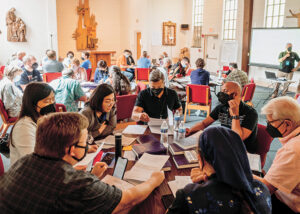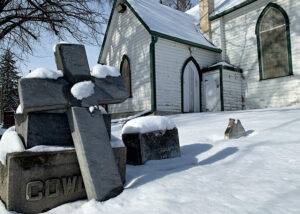In the first days of 2020, our newsfeeds were full: confrontations over a pipeline in western Canada, devastating fires in Australia, an earthquake in Puerto Rico, the death of 176 people whose airplane was shot down and speculations of a possible war in the Middle East.
Many of us deal with the constant barrage of news—mostly bad—that threatens to overwhelm our spirits and paralyze our hands. How do we cultivate hope?
Leading up to the Anabaptist World Fellowship Sunday, celebrated by many on Jan. 19 this year, Mennonite World Conference (MWC) called for a hope grounded in Jesus. This communion of almost 1.5 million Anabaptists from around the world chose as its theme, “Jesus Christ: Our hope.” The affirmation: “Even in the midst of deep troubles, we come together from around the world to follow Jesus, who gives us hope.” (See more online at bit.ly/2FR2jkp.)
Many North Americans live in a privileged reality, far from these current natural disasters and troubling violence. Yet, as citizens of the world and members of the worldwide body of Christ-followers, we too feel the effects of pain elsewhere and we search for hope.
Hope is an elusive thing—living somewhere between unrealistic optimism and paralyzing despair. We cannot magically drum up hope and yet it is part of our heritage as Christians. Here are some hope-cultivating practices:
Lament and gratitude
One of MWC’s suggested texts was Lamentations 3:21-26, a portion that acknowledges God’s steadfast love in a world gone awry. We need to take time in our corporate worship and in our personal lives to acknowledge the places where injustice and violence are flourishing. At the same time, we affirm with the prophet, “The steadfast love of the Lord never ceases, his mercies never come to an end; they are new every morning; great is your faithfulness” (Lamentations 3:22-23). In cultivating hope, we acknowledge God’s good gifts and we will live in a spirit of thankfulness.
In gratitude, we can sing the beloved hymn, “Great is Thy Faithfulness,” watching for God’s hand at work in good-news stories of selflessness, courageous peacemaking and restorative justice. We say “thank you.”
Resting and waiting
“It is good that one should wait quietly for the salvation of the Lord,” affirms Lamentations 3:26. Psalm 62, another passage suggested by MWC, says, “For God alone my soul waits in silence, my hope is from him.” This resting and waiting are part of the practise of the Sabbath, an acknowledgement that we humans are ultimately not in control; God is the source of all power. In cultivating hope, we trust that God is acting in the world and that God will empower us for acts of faithfulness.
We can take mini-sabbaticals by stepping away from the computer, the smartphone, the newspaper and TV news. We disconnect, knowing that God is larger than our human efforts.
Generosity and action
MWC also chose the gospel story of the four friends who carried the paralyzed man to Jesus for healing (Mark 2:1-12). Across Canada and the United States, supporters of Mennonite Central Committee (MCC) took part in The Great Winter Warm-up, an effort to stock MCC’s storehouses with 6,500 comforters to be shared with people in vulnerable situations around the world. We offer hope by sharing our gifts with people in places of need.
We can stitch hope into an MCC comforter or volunteer with a charity doing good work in our own neighbourhood.
A final passage MWC suggested is the Apostle Paul’s prayer in Ephesians 1:15-19: “I pray that the God of our Lord Jesus Christ, the Father of glory, may give you a spirit of wisdom and revelation as you come to know him, so that, with the eyes of your heart enlightened, you may know what is the hope to which he has called you, what are the riches of his glorious inheritance among the saints, and what is the immeasurable greatness of his power for us who believe, according to the working of his great power.”
New columnist
With this issue, we welcome Joshua Penfold, who will be writing under the theme, Tales from the Unending Story. Joshua has been sharing his explorations into Scripture with his Facebook friends and now he can share similar reflections with a larger audience. We look forward to learning about how his Bible reading intersects with his life as a disciple. Joshua lives with his family near Tavistock, Ont., and attends Tavistock Mennonite Church. You can read his first submission here.
Read more editorials:
Reporting on #ChurchToo
#ICYMI: 2019 in review
Church publications: Which way to go?
What shall I wear: Sport coat or cardigan?
Going deeper together









Leave a Reply
You must be logged in to post a comment.